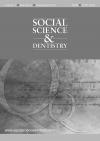Social Science and Dentistry

- Cover Date:
- December 2010
- Print ISSN:
- 2040-4263
- Vol:
- 1
- Issue:
- 2
Meeting at the University of Sheffield
Social Science & DentiStry
Meeting at the UniverSity of SheffielD 24th JUne 2010
this meeting of lecturers who teach social sciences within dental schools took place at the University of Sheffield on 24th June 2010. the meeting was conceived and organised by Dr Sarah Baker and Dr Barry Gibson from Sheffield and also Dr catherine exley from newcastle and Prof tim newton from Kings college london. Delegates were invited from dental schools across the UK and representatives from nine of these attended (Birmingham, Bristol, cardiff, Dundee, Kings, newcastle, Nottingham, Sheffield, and St. Andrews). the day started at 10.00am with coffee and introductions and then Dr exley and Prof newton each spent some time considering the position of sociology and psychology within dental teaching and research. Key issues which were raised in these introductory talks included similarities and differences between lay and professional understandings of oral health, individual interpretations of the invasion of body space as a consequence of dental treatment and also oral health and its importance with regard to perceptions of appearance. in this joint session it was also proposed and agreed that a repetition of the 1999 Mcgoldrick and Pine paper published in the BDJ (McGoldrick & Pine, 1999) should be undertaken by those present at the meeting. this paper examined sociology and psychology teaching for dental undergraduates across the 14 UK dental schools which were in existence in 1994 -1995 and concluded that most social science teaching at that time was theoretical and at a pre-clinical level. as a group, we were interested to know whether anything has changed since then in the 18 dental schools which now exist across the UK. there was also some brief discussion about an MSc course in Social Science and Dentistry which is currently under development in Sheffield. after this plenary session, there was break-out into the two disciplinary groups. in the psychology session, discussion took place concerning areas of common interest where collaboration would be feasible. these included adherence to treatment plans and also oral hygiene practices (eg flossing), the recognition of pain (from both patient and clinician perspectives), teaching and learning psychology (with particular respect to the teaching of communication skills) and also the different ways in which patient management can be assessed including the management of child patients on paediatric clinics with an assessment of child behaviour as a basic intervention. With particular regard to the teaching of communication skills, attention was drawn to the MeDev website (http://www.medev.ac.uk/ourwork/community/ukcouncil/) and also to the European Association for Communication in healthcare: http://www.each.nl/ for the provision of inspiration with regard to potential curriculum components. in the sociology breakout session, there was discussion about the importance of having a presence both within medical sociology and dentistry – in part this could be achieved with the presentation of work at the BSa Medical Sociology conference. after lunch, there was a further plenary session where the thoughts of each disciplinary group were summarised leading to further discussion about how to take the group forward. Both groups reported on the difficulties of getting funding and of getting work published as social science in the field of dentistry seems to fall between several camps (at least this was the case before the advent of Social Science & Dentistry!) – the issue of getting qualitative work published was raised as a particular issue in the sociology group. it was agreed that the formation of this social science group was a positive step and that another meeting with the same group members should take place within the year. this was an enjoyable meeting which provided an excellent opportunity for networking and the discussion of shared topics of interest. the consensus was that it was very good to meet with likeminded people and that every attempt should be made to raise the profile of the group. Andrea Waylen, University of Bristol
- Article Price
- £15.00
- Institution Article Price
- £
- Page Start
- 118
- Page End
- 118
- Authors
Articles from this issue
- Title
- Pg. Start
- Pg. End
- Journey to the dental office: a study of dental illness behaviour exhibited by people visiting government and private dental services in Delhi, India
- 69
- 76
- Exploring the concerns and needs of patients with terminal head and neck cancer and their caregivers
- 88
- 96
- Mothers’ understanding of dental-caries related feeding practices and children’s use of dental care in Ajman
- 97
- 107
- Anxiety reduction via brief intervention in dentally anxious patients: a randomised controlled trial
- 108
- 117
